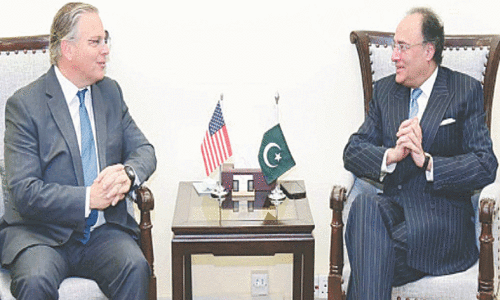
WASHINGTON: Islamabad’s decision to send a prime ministerial advisor to the State Department to seek US support for its efforts to revive the economy, and then disown his visit as a “personal” one, has surprised many in Washington’s diplomatic circles.
Tariq Fatemi, who is currently serving as special assistant to the prime minister, arrived in the US capital last week and held brainstorming sessions with officials at the Pakistan embassy, including the ambassador.
On July 21, he met US Deputy Secretary of State Wendy Sherman at her office and on the same day, Ms Sherman posted a brief message on her official Twitter: “I met with Special Assistant to the PM of Pakistan Ambassador Fatemi to reaffirm our shared goals of expanding relations through enhancing economic and commercial ties.”
She also wrote that the US was “looking forward to working together and celebrating 75 years of diplomatic relations” between the two countries.
Expert says such ‘backtracking’ gives rise to questions about institutional cohesion in Pakistan
State Department spokesperson Ned Price confirmed the meeting as well, adding that talks focused on “coordination on Afghanistan, regional stability” and on “the devastating effects of [Russian President] Putin’s invasion of Ukraine on food security in Pakistan and worldwide”.
The Pakistan embassy also issued a press release of the same, and media in Pakistan also covered the meeting. Some circles speculated that Mr Fatemi was sent to arrange a meeting between US President Joe Biden and Prime Minister Shahbaz Sharif during the UN General Assembly in New York, being held in September this year.
But on July 22, a spokesperson for the Ministry of Foreign Affairs in Islamabad disavowed the meeting. Asked at a news briefing to share the agenda of the talks, the spokesperson said: “Mr Fatemi is on a private visit to Washington and [the] Foreign Office did not play any role in his meeting with US officials”.
This caused considerable consternation to the American side, and Washington circles expressed concern.
In the US capital, Pakistan is increasingly being seen as a country where domestic political concerns often override relations with other nations, even if it is with a superpower like the US.
Diplomats — including at least two former Pakistani officials who have served in the US — point out that this has happened twice now: once during the so-called Cablegate controversy and, now with the visit of a senior Pakistani official to Washington.
“In the first case, a secret diplomatic cable was used to whip-up public support for a government that was facing a no-trust move,” said one of the two senior Pakistani diplomats.
“In the other case, the government sends a senior official to Washington, apparently to seek support for its efforts to revive the ailing economy but then disowns it, apparently because it fears annoying some quarters.”
“So, why deny it?” asked a diplomatic source, while commenting on this strange development. “There’s nothing earth-shattering in the official statements. Nothing that needed even an explanation, leave alone a denial.”
Hassan Abbas, who teaches international relations at Washington’s National Defence University, told Dawn that in his opinion, “A personal meeting with an official as senior as a deputy secretary is highly unlikely, particularly in the current situation. Such meetings do not happen without state support.”
He said that Pakistan changing its position like this “raises unnecessary questions about institutional cohesion in Pakistan at a time when Pakistan needs all kinds of support for its economic stability and regional policy vis-a-vis Afghanistan.”
Published in Dawn, July 28th, 2022














































